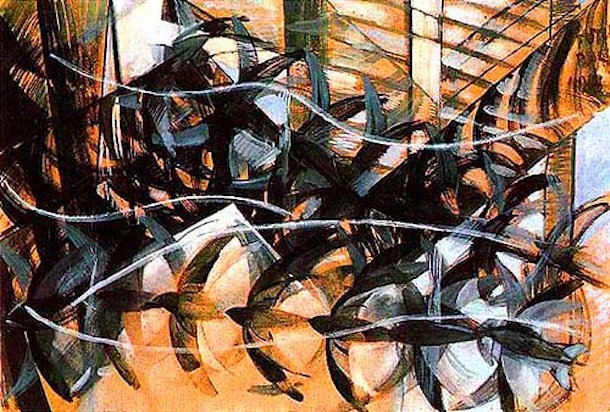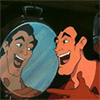|
AFancyQuestionMark posted:You lot are trying to define what the purpose of art should be, and the negative effects of indulging in art that doesn't fill that purpose. Eating junk food is proven to have negative health effects. If you want to extend that analogy to genre fiction and the spirit or moral and intellectual character, you should lay out why you think this is the case. For starters, you would have to explain what it is exactly that's being negatively impacted by overindulgence in reading the wrong sort of fiction. Our side of the argument was not the one that first tried to draw comparisons to food and alcohol. All we've done is point out the surface incoherence of that sort of analogy. Don't hold us to it.
|
|
|
|

|
| # ? Jun 3, 2024 15:05 |
|
Okay, so if you've discarded that analogy, what harm is there exactly in reading genre fiction? Why is it a dilution of the purity of art or whatever mel was going on about?
|
|
|
|
AFancyQuestionMark posted:You lot are trying to define what the purpose of art should be, and the negative effects of indulging in art that doesn't fill that purpose. Eating junk food is proven to have negative health effects. If you want to extend that analogy to genre fiction and the spirit or moral and intellectual character, you should lay out why you think this is the case. For starters, you would have to explain what it is exactly that's being negatively impacted by overindulgence in reading the wrong sort of fiction. porfiria posted:People who are really into literature are, in my experience, slightly worse than people who aren't.
|
|
|
|
Ras Het posted:I don't want to commit myself to any opinion on this issue, but it's interesting how the idea that there is a thing like "spirit" that can be nourished by art, culture and sensible living has become marginal, and nowadays if people defend the value of high art they're more typically forced to retort to self help like platitudes and rationalisations. Is this commodification To be fair a bunch of the people who contributed in the past ~200 years to the decline of the idea that art is or should aspire to be in some way edifying were the artists themselves (and that's probably a good thing on balance imo)
|
|
|
|
Sham bam bamina! posted:I can tell you firsthand that I would be a much bigger rear end in a top hat with a much smaller mind if the wealth of perspectives, philosophies, and experiences in the books that I've read hadn't straightened me out. Be thankful, be very thankful, that it's this version of me whose posts you get to put up with. Data is not the plural of anecdote. It is entirely possibly to envision plenty of scenarios where reading literature doesn't improve anything about a person. Further, even if that was a universal truth, it still doesn't explain how reading genre fiction negatively impacts people, merely how reading literature supposedly elevates them.
|
|
|
|
Don't worry, I'm working on an effortpost.
|
|
|
|
AFancyQuestionMark posted:Data is not the plural of anecdote. It is entirely possibly to envision plenty of scenarios where reading literature doesn't improve anything about a person. Further, even if that was a universal truth, it still doesn't explain how reading genre fiction negatively impacts people, merely how reading literature supposedly elevates them. Well, if we compares post quality...
|
|
|
|
Eugene V. Dubstep posted:Well, if we compares post quality... I rest my case.
|
|
|
|
AFancyQuestionMark posted:I rest my case. Zounds! Hoisted by my own petard!
|
|
|
|
lost in postation posted:To be fair a bunch of the people who contributed in the past ~200 years to the decline of the idea that art is or should aspire to be in some way edifying were the artists themselves (and that's probably a good thing on balance imo) Sure, but I think the idea lingers stronger in certain types of art. Like I think architects are much happier to go into quasi-religious psychobabble about their work than writers. Or maybe that's just the Twitter accounts I happen to follow
|
|
|
|
AFancyQuestionMark posted:You lot are trying to define what the purpose of art should be, and the negative effects of indulging in art that doesn't fill that purpose. Eating junk food is proven to have negative health effects. If you want to extend that analogy to genre fiction and the spirit or moral and intellectual character, you should lay out why you think this is the case. For starters, you would have to explain what it is exactly that's being negatively impacted by overindulgence in reading the wrong sort of fiction. People are trying to find the purpose of art/literature, and saying if something doesn't fulfill that purpose it's bad art. And this is a problem?
|
|
|
|
There's a funny tension that serious authors have over the last hundred or so years as to whether literature (or sculpture, or painting) is supposed to have a moral or edifying value. The martinets haven't always been on the side of politics in art, but I'll leave their aesthetic arguments for some other poster that actually believes them to lay out. Politics in art is common, either as a byproduct of the times or intentionally. But it's hard to live in the world and create art that relates to it without letting "politics" informing that art. Art, it turns out, is a very effective method for communicating ideas. Weird little sub-communities like the Futurists spring up and create a genre that is expressly political, even if it isn't clear how this is supposed to convey a political message:  Self-consciously political literature has had great effect in America. Sinclair's The Jungle and Stowe's Uncle Tom's Cabin were written primarily to convey a message and call to action. They achieved their aims, becoming hugely popular and each became the reference point to the common person for a societal wrong. It's like how today most people know the story Watergate more from All the President's Men than from the primary articles or videos themselves. Achebe's Things Fall Apart and To Kill a Mockingbird (which kicked this whole thing off) are expressly political but didn't really change the world. They get taught in high schools because they are also to some degree good literature. I think it's more from the way public school canons feel the need to justify reading literature. You can't just teach "Great Works" anymore, you also have to tie it into another subject. One thing that I think people asking for "literature" to read are looking for, that people who've already read a lot don't get, is that they want a list of Great Books to read. Instead they tend to get wishy-washy quasi-recommendations, or questions about their interest. But they'd like a list of twenty books that make up the consensus of great literature. Our problem is that we've destroyed the notion of a Canon of Literature. And the objections (jingoism, sexism, etc.) are 100% correct: The English Literary canon was expressly created by White Male Academics of the British Empire to constitute the works that best conveyed English ideas and sentiments to its colonies. But that doesn't necessarily make any of the works on there BAD. And in many ways, our lack of a common core of understood literature is killing our society. You can't run a society with a shared understanding of Big Bang Theory, and that's not a dig at the quality of the show or anything. But when you know that every educated and upper- or middle-class person in the country has read the same twenty books, you've got a lot of common imagery and assumptions you can play off of in communicating. So do I bemoan all the kids reading Harry Potter instead of Chopin's The Awakening? Not really. The same complaints were leveled at The Awakening and all women's lit a hundred and twenty years ago: It's simplistic, it's escapism, it's titillating. In short, there is no difference between good and bad things. They are exactly the same.
|
|
|
|
poisonpill posted:So do I bemoan all the kids reading Harry Potter instead of Chopin's The Awakening? Not really. The same complaints were leveled at The Awakening and all women's lit a hundred and twenty years ago: It's simplistic, it's escapism, it's titillating. In short, there is no difference between good and bad things. They are exactly the same. "The fact that some geniuses were laughed at does not imply that all who are laughed at are geniuses. They laughed at Columbus, they laughed at Fulton, they laughed at the Wright brothers. But they also laughed at Bozo the Clown."
|
|
|
|
The escapism argument is perfectly valid for Harry Potter, since afaict they're books that are meant to cheer up depressed tweens. It's a less obvious argument for Gritty Adult Fantasy where people get raped constantly
|
|
|
|
I mean, what even is literature anyway, man? A way of controlling the people's thoughts! Since you've been in such a positive mood lately, I'm curious, what is good? Like, is there a top twenty list of best novels? It's stupid to even try to compose this in a vacuum, you need a point or a goal. So why not most edifying, or most political, or most escapist? What goals are worthy? Are works that fit this goal best better than those that don't?
|
|
|
|
This pseudo-populism among genre fans is pretty widespread. The idea is that the authors of yesteryear we consider "great" today were often authors of popular fiction, and thus the only thing keeping modern genre fiction out of literary canons is that not enough time has passed for academic prejudice to fade away. The fallacy though is that the literature of the past we consider "great" only represents a small portion of everything that has been published. You can check, for example, a list of American bestsellers from the end of the 19th Century, and only two or three books might be remembered by people outside of specialist scholars (Prisoner of Zenda, Red Badge of Courage, and Quo Vadis). The difference today is that the cultural dominance of genre fiction has led to academia often prostituting itself by trying to elevate Harry Potter and the like. No one finds Harry Potter as profound as a canonical work, but it's one of the few things you can expect most people to have read. BravestOfTheLamps fucked around with this message at 13:14 on Feb 7, 2019 |
|
|
|
Mrenda posted:People are trying to find the purpose of art/literature, and saying if something doesn't fulfill that purpose it's bad art. And this is a problem? People aren't trying to find the purpose of art, they're trying to define it, without offering any substantial reasoning to support their decree.
|
|
|
|
BravestOfTheLamps posted:This pseudo-populism among genre fans is pretty widespread. The idea is that the authors of yesteryear we consider "great" today were often authors of popular fiction, and thus the only thing keeping modern genre fiction out of literary canons is that not enough time has passed for academic prejudice to fade away. I don't think I ever stated or implied that best sellers are automatically great works. Quite the opposite, in fact. I think you're responding to points that you've seen over and over, and I agree with you to that extent. I am also saying that even some of the Great Works of the cannon are "great" because of things beyond the four walls of their text: their political impact, the position or influence of their authors, or just how widely read they were. To Kill a Mockingbird is now a canon work in high schools not because it's the best example of Southern dialogue to be found, but a fusion of its easiness to read, its political function, and the position of its author(s?). That's not to say that Ben-Hur and Ivanhoe are particularly profound or even engaging, but they're worth reading if you're reading books because they greatly informed the ideas of their times.
|
|
|
|
BravestOfTheLamps posted:The fallacy though is that the literature of the past we consider "great" only represents a small portion of everything that has been published. You can check, for example, a list of American bestsellers from the end of the 19th Century, and only two or three books might be remembered by people outside of specialist scholars (Prisoner of Zenda, Red Badge of Courage, and Quo Vadis). The inverse is also true and confirms the fallacy. See (the admittedly tired example of): John Williams ^^^ why "author(s?)"
|
|
|
|
There's a probably-not-true theory that Truman Capote helped or ghost-wrote some of the book. It's honestly probably all wrapped up in sexism and not true, but when talking about how TKaM became influential, Capote's influence, at least in the NYC literary circles that decided what got a lot of press attention and what didn't is a pretty important component.
|
|
|
|
Mrenda posted:Please do argue your argument. I'm interested as poo poo in this. I already pretty much argued it earlier and the convo has gone away from it I am not saying genre fiction can't have significance or merit (mostly because I don't think genre fiction exists). I also don't particularly think there is that distinct of a difference between "literature" and the dregs of fiction. Nearly all art, by the virtue of being a human endeavor, has significance to the reader. My argument is that the trend of "world-building" at its most extreme seems to be built around creating narrative that fails to provide significance to either the text or the reader. A fictional world should, I argue, exist as a vehicle for significance. If the construction of the world is wholly superfluous to what is the experience of the reader, it becomes almost wholly unnecessary. I mean, I don't really think great art makes us more moral. I think it was William Styron who said "The nazis listened to Wagner as they sent Jews to the gas chambers." Art, in and of itself, is not redemptive. However, art provides the gateway for the exploration of the self, and of ones subject positioning. It is through that exploration that one betters oneself. The medium is not redemptive. However, the experience the medium provides is. Mel Mudkiper fucked around with this message at 13:43 on Feb 7, 2019 |
|
|
|
Sorry for falling behind the discussion, but I don't think I'm too far behind.AFancyQuestionMark posted:Okay, so if you've discarded that analogy, what harm is there exactly in reading genre fiction? Why is it a dilution of the purity of art or whatever mel was going on about? Now, I'm using the hypothetical "you" here, of course. Also, I am not saying that this is specific to genre fiction; someone could just as well do this kind of thing by only reading more serious writing along a narrow range of themes. In fact, this doesn't even have to be about books at all – only reading genre fiction is bad for the same reason that only staying in any kind of comfort zone is bad. But its badness is a particularly dreary kind to anyone who's even dipped a toe into the ocean of literature's possibilities (for example, TBB's own OscarDiggs, whose joy in finally "trying literature" after years in the rut I described earlier is impossible to miss; he will not be going back into that rut now that he's felt what's beyond it). For someone to insist that my medium-rare ribeye is no better than the mound of Twinkies piled on their plate and that I'm actually some self-enamored dickhead for thinking otherwise, that I only want to believe it's better because it gives me something to lord over them, is as pitiable as it is insulting. Why is it steak on one plate and sugar on the other? Mel uses a lot of overblown, vaguely teleological phrases like "the human endeavor", but Ras Het gets to the point, more or less: Ras Het posted:I don't want to commit myself to any opinion on this issue, but it's interesting how the idea that there is a thing like "spirit" that can be nourished by art, culture and sensible living has become marginal, and nowadays if people defend the value of high art they're more typically forced to retort to self help like platitudes and rationalisations. Is this commodification Sham bam bamina! fucked around with this message at 08:54 on Feb 10, 2019 |
|
|
|
Mel Mudkiper posted:My argument is that the trend of "world-building" at its most extreme seems to be built around creating narrative that fails to provide significance to either the text or the reader. A fictional world should, I argue, exist as a vehicle for significance. If the construction of the world is wholly superfluous to what is the experience of the reader, it becomes almost wholly unnecessary. A few of us stated this already (albeit a little more polemically), but it really is the crux of the argument. Significance is key and too often you hear "oh it's just a bit of world-building" as a response to "why is that there?". Honestly, I never even come across the term in any "serious" literary criticism or analysis; only ever in the sense of it being there for the sake of itself. What happened to "setting"?
|
|
|
|
Please, the term is milieu.
|
|
|
|
Sham bam bamina! posted:Picked up a used copy of Osamu Dazai's The Setting Sun today, a 175-page paperback that promises more back-breaking toil in navigating the swamp of its Literary Depth than anything from the Sanderson oeuvre can muster. I do not know why I subject myself to this labor, this drudgery.
|
|
|
|
Please don't use my posts in non-vegan analogies, particularly if you're going to badmouth raw high fiber vegetables
|
|
|
|
Ras Het posted:Please don't use my posts in non-vegan analogies, particularly if you're going to badmouth raw high fiber vegetables Mea culpa on the steak. 
|
|
|
|
Mel Mudkiper posted:I already pretty much argued it earlier and the convo has gone away from it Somewhere I was getting the idea you disagreed with my take on what your "contextualising reality" is, or now your significance. You might disagree with that, I was more wondering where that was. Now I just think you were disagreeing with my viewpoint that genre fiction doesn't do this, or people don't make the case that it does. Mrenda posted:How does genre contextualise reality for you? How do you respond to what's written in genre fic? This is all a qualitative (within a quantitative frame given that I'd like to see it multiple times.) I want these qualities many times. It's not a morality thing, or edification it enriches me (although you could argue any enrichment is edification, I'm not just talking about being better though, but experiencing, feeling, thinking, relating to, understanding more: all aspects of what it is to live.) There's also a totality to take in, as much of the novel as I can see at anyone one time once I've read it. But from the experience of reading, and creating the text as I read, the significance must be real, and ever more real in how it places the varying elements of me in relation to myself and the greater world.
|
|
|
|
Mrenda posted:Somewhere I was getting the idea you disagreed with my take on what your "contextualising reality" is, or now your significance. You might disagree with that, I was more wondering where that was. Now I just think you were disagreeing with my viewpoint that genre fiction doesn't do this, or people don't make the case that it does. Lemme take a look at what you wrote, I kind of lost track of the argument in this thread for awhile
|
|
|
|
Sham bam bamina! posted:Death Comes for the Archbishop Just going to interrupt to say that everyone should read this book. It's not very long, the prose is fairly simple, and it's just unspeakably beautiful.
|
|
|
|
I appreciated your effortpost Sham Bam, and I largely agree. So why do people get trapped in the rut of genre fic in the first place? My experience was of genre fic being something I read for pleasure by myself, compared with Proper Literature being taught at school, badly, with group reading guaranteed to kill off any joy. Some of those books I've reread since and been amazed by how much better they were than I remembered. I imagine that that's a fairly common experience, and it really teaches the lesson that Proper Literature is dull and hard work and not enjoyable enough to be worth it. The inverse being that enjoyable reading is genre fiction. To me, the fallacy I had until recently was that you could have "fun and easy" or "worthy" and not both. And when I decided to challenge myself, there wasn't really a canon anymore that wasn't 'tainted' by age/gender/ethnicity/etc. (Whoever mentioned the difficulty created by the death of the old canon was bang on) That made even finding something to read seem impossibly daunting (compared to grabbing something from the sci-fi rack), so it was really easy to just say gently caress it and give up. What we need, I reckon, is a genre reader recovery pack. Not meaning that in a patronising way, just "here's a recommendation for if you liked X but want to explore a bit".
|
|
|
|
|
I don't think the canon of western literature has gone anywhere. Even the arguments that it should go away are basically polemics that hang on trivialities
|
|
|
|
Ras Het posted:I don't think the canon of western literature has gone anywhere. It never went anywhere because it never was
|
|
|
|
BravestOfTheLamps posted:"The fact that some geniuses were laughed at does not imply that all who are laughed at are geniuses. They laughed at Columbus, they laughed at Fulton, they laughed at the Wright brothers. But they also laughed at Bozo the Clown." I don't think that arguing that a tradition of less white performers is inherently less artistic is a good argument against the accusation of elitism.
|
|
|
|
Mel Mudkiper posted:It never went anywhere because it never was That's dumb
|
|
|
|
Ras Het posted:That's dumb the idea of a canon is fundamentally an ethereal and wholly transitory collection of cultural assumptions that exists more as an expression of cultural hegemony than an analysis of cultural value
|
|
|
|
tonberrytoby posted:I recently an argument for why the increased appreciation for clowning as an artform is a sign of the changing view on Sinthi & Roma influenced culture.
|
|
|
|
Mel Mudkiper posted:the idea of a canon is fundamentally an ethereal and wholly transitory collection of cultural assumptions that exists more as an expression of cultural hegemony than an analysis of cultural value Yeah duh. I don't understand what your issue is
|
|
|
|
Sham bam bamina! posted:Bozo was white.
|
|
|
|

|
| # ? Jun 3, 2024 15:05 |
|
tonberrytoby posted:He was a performer in an art-form with strong non-white influences. I have never heard an argument against him being an artist that doesn't entirely rely on that fact. Sham bam bamina! fucked around with this message at 15:19 on Feb 7, 2019 |
|
|



















